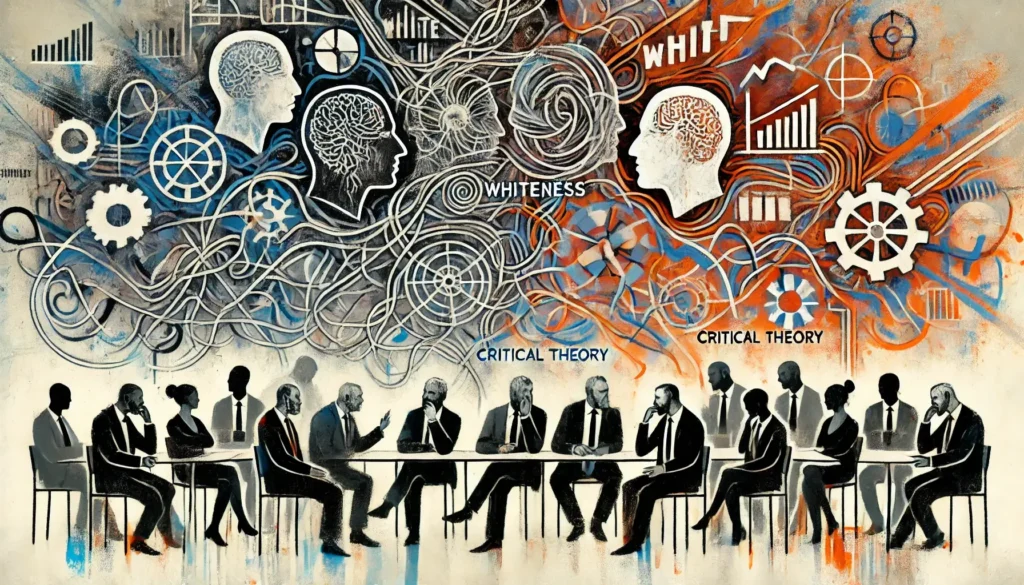Whiteness – Turning Skin Colour into Original Sin
From Colour to Condemnation
“Whiteness” used to describe a skin tone. Now it’s a political category, a moral stain, and a full-time job for academics.
In Critical Theory, it isn’t just about being white. It’s a system, a culture, a permanent privilege that you can never escape — only apologise for.
It’s not biology. It’s ideology. And it’s the new original sin.
Table of contents
What Is Whiteness?
In social justice jargon, whiteness means more than race. It’s the invisible system of privilege that supposedly benefits all white people, everywhere, all the time.
- Born rich? Privileged.
- Born poor? Still privileged — by skin.
- Born centuries after slavery? Privileged anyway.
Whiteness theory insists that privilege is automatic, permanent, and collective. No exceptions.
Buzzwords
The “whiteness industry” thrives on jargon. Some favourites:
- “White privilege” – Built-in advantage, even if you’ve never felt it.
- “White fragility” – If you deny privilege, that proves you have it.
- “White supremacy culture” – Everyday habits like punctuality or meritocracy are recast as oppressive.
- “Decentering white” – Translation: shut up and listen.
It’s not dialogue. It’s dogma.
How It Shows Up in Practice
- Universities run seminars on “abolishing whiteness.”
- Workplaces train staff to “check” their whiteness.
- Schools rewrite curricula to highlight “white privilege” as a permanent problem.
- Media frames ordinary behaviour as signs of systemic whiteness.
Everyday people end up guilty by association with their skin tone.
Why Institutions Promote It
Because guilt is currency.
- Academics publish endless papers on whiteness studies.
- DEI consultants design corporate trainings around dismantling it.
- NGOs raise money to “decenter” it.
- Corporations rebrand around anti-racism campaigns.
If whiteness is permanent, so is the industry that manages it.
The Consequences
- Collective guilt. Individuals judged for traits they can’t control.
- Silenced voices. “Whiteness” means some opinions automatically matter less.
- Division. Society split into permanent villains and permanent victims.
- Backlash. Ordinary people resent being blamed for things they never did.
Instead of tackling racism, whiteness theory risks fuelling more of it.
Why It Matters
Whiteness has moved from niche academia to mainstream policy, HR, and media. It reshapes how people see themselves and others.
By treating skin colour as destiny, this theory undermines universal equality and replaces it with a permanent moral hierarchy.
From Awareness to Original Sin
The irony? Efforts to expose privilege have turned skin colour into a curse you can’t wash off. Whiteness is framed as an eternal flaw, passed down like a genetic tax.
It promised awareness. It delivered shame.
FAQ
What does whiteness mean in Critical Theory?
It is framed as a system of privilege tied to being white, not just a skin colour.
Why is it controversial?
Because it judges people collectively, treating privilege as automatic and permanent.What are examples of whiteness in practice?
Seminars on white privilege, HR trainings, and education programs focusing on systemic whiteness.
Who benefits from whiteness studies?
Universities, DEI consultants, NGOs, and corporations profiting from anti-racism campaigns.
What’s the risk of this theory?
It entrenches division and guilt, trivialises real racism, and punishes people for identity traits.
How does whiteness connect to systemic racism?
Whiteness theory argues that systemic racism is sustained by invisible “white privilege.” The two concepts reinforce each other in DEI training and critical race theory.
See also: Privilege Explained, Systemic Racism Explained.



